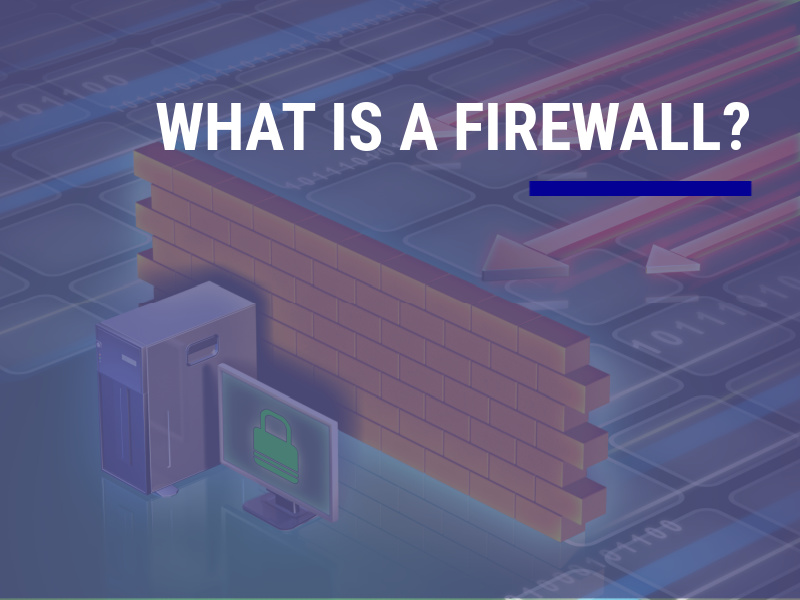
03 Oct What Is a Firewall (& Why Do You Need One)?
More and more of your business is conducted online.
Payroll, employee information, client contracts, sales reports, and more are all stored on your network for easy accessibility for your employees. While having a digitized workflow and a paperless office certainly makes daily tasks more efficient, it also comes with some risks.
That’s why your network security is of the utmost importance. A proper firewall is the first step in protecting your network. We’ve all heard of a firewall, but what it does can be murky.
Read on for more information about firewalls, how they work, and how Consortyo can make sure your network security is as tight as possible.
What Does a Firewall Do?
A firewall is a network security device that protects your local area network from outside networks. A firewall monitors your business’s regular traffic and security protocols and decides whether or not to allow or block specific traffic from an external network.
Have you ever gone to a new site, and instead of connecting you immediately, your browser tells you this site is unsafe, and you should proceed with caution or go back? Your firewall has determined that this site may contain malware that could harm your personal computer and all other computers on that network.
Your computer’s firewall assesses the content of the data you’re attempting to access, the sender’s address, and the application this data is meant for to determine if it is safe.
IT professionals can also use firewalls to monitor bandwidth usage, restrict certain pages, identify dangerous attachments, and more.
Initially, firewalls will block all external ports. Strong IT professionals, like the team at Consortyo, can customize your firewall to match your business needs.
Types of Firewalls
Like all technology, firewalls have evolved. The size of your network and the number of people accessing it will play a part in what type of firewall best fits your needs.
Firewalls can be both software and hardware. Software firewalls are programs installed on your network devices themselves. Hardware firewalls are physical computing devices that act as gateways between the internet and internal networks.
With every device connected to your network, there’s a threat of malware. That’s why firewalls come in many formats. Here are a few.
Packet-filtering Firewalls
Packet-filtering firewalls are the most basic type, but they are still fast and moderately efficient. They analyze the source and destination IP addresses and source and destination ports to determine whether an outside network or website is a threat.
The most basic type of firewall means there are limits to what a packet-filtering firewall can detect.
Proxy Firewall
Also called an application-level gateway, a proxy firewall allows an external client to seek permission to access your internal network through a proxy. If the proxy verifies the authenticity of the request, they may access your network.
Similar to a proxy firewall is a VPN or virtual private network, a tool many businesses use for remote employees. A VPN is an encryption tool for verifying requests to access your private network from external IPs and locations through a secure tunnel.
Stateful Inspection
A stateful inspection firewall blocks traffic based on state, port, and protocol, monitoring all activity from when the connection is opened to when it is closed. New packets are analyzed and compared to all other packets transmitted over the network, as opposed to on a case-by-case basis.
Next-Generation Firewalls
A next-generation firewall can identify a bad connection by the contents of it and the program or website that is supposed to be receiving it. They can then enforce protocols based on the intended application.
Who Needs Firewall Protection?
In short, everyone needs a firewall on their computer. That’s why firewall safeguards come standard on all Macs, PCs, and routers.
But for your business, that pre-installed software is not enough.
Your network holds a lot of private, critical information about your business and your employees, and companies must protect it appropriately. The good news is that top-quality, state-of-the-art firewalls will not be a huge financial drain.
Firewalls do more than just stop dangerous websites from accessing your network. They can also prevent you and your employees from making a quick misjudgment that could be catastrophic.
Hackers and cybercriminals are constantly evolving and discovering more clever ways to possibly trick your employees into clicking on a bad link. It takes strong firewalls and vigilant IT professionals to keep your network secure.
Trust Consortyo to Keep Your Network Safe
At Consortyo, we put your network security above all else. If you are using only the basic pre-installed firewall or you’re looking to increase your security level, Consortyo can get you there.
We’ll analyze your business needs, contact your internet provider, and have your firewall installed at a scheduled time so it doesn’t interrupt your workflow. After installation, our IT professionals monitor your network to ensure the firewall is working correctly without slowing down your work.
Call Consortyo today to set up the right firewall software to keep your network secure.



